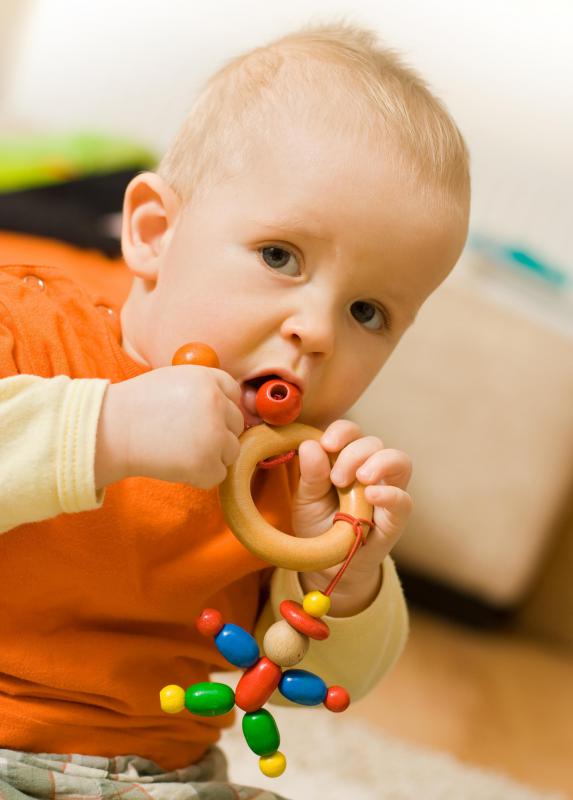At WiseGEEK, we're committed to delivering accurate, trustworthy information. Our expert-authored content is rigorously fact-checked and sourced from credible authorities. Discover how we uphold the highest standards in providing you with reliable knowledge.
What are Some Causes of Late Teething?
Late teething in an infant is usually defined as teeth coming in after the age of 13 months. Many people worry that late teething could be a sign of a bigger issue, but it is often nothing to worry about since every baby is different when it comes to milestones. A teething schedule could be affected by various factors, including genes, nutrition, or a medical condition.
Like any other milestones, some babies are just naturally late bloomers. This is especially true of infants whose older siblings and parents were the same way. A parent who did not cut their first tooth until well after a year old should therefore not be surprised when his baby experiences late teething, as well. Fortunately, though the average infant gets his first tooth between five and seven months, most pediatric dentists do not worry unless the baby's teeth have not come in by 18 months, especially if the pattern is hereditary.

In some cases, a child with no teeth by 18 months has poor nutrition. Typically, though, there are other warning signs of this condition aside from a lack of teeth. A baby that is underweight for his age and appears to have smaller, weaker limbs than expected should be checked out by a pediatrician. Some nursing babies do not get enough breast milk and need to supplement with formula in order to stay in the target weight range for their age. It is crucial that they get enough vitamin A, C, D, phosphorus, and calcium in order to form healthy teeth, so a diet lacking these nutrients may contribute to late teething.

There are some medical conditions that can result in a delayed teething schedule, but they also often come with other symptoms, as well. For example, hypothyroidism involves a thyroid that is under active, often resulting in fatigue, joint stiffness, headaches, and trouble losing weight, to name a few symptoms. Late teething, birth weight of more than eight pounds (3.6 kg), delayed walking, and late talking could all be early signs of hypothyroidism in an infant.

Of course, not all people who suffer from this condition display these symptoms, and sometimes early teething is also a sign of hypothyroidism. Conversely, all of these symptoms could be normal for some people, which is why testing is often required to diagnose the issue. Therefore, if late teething does not run in the family, and no teeth have come in by 18 months, it is important to see a pediatrician. A visit to the doctor can often rule out poor nutrition and other medical conditions early on.
AS FEATURED ON:
AS FEATURED ON:















Discussion Comments
My daughter started showing signs of teething at the age of 4 months, but it is now running to 11 months and no single teeth is seen. I am told that mine popped out at the age of 5 months and so it is not hereditary. I am still waiting to see when they come out. I think when the doctor says when the teeth are late, some usually have strong teeth. Mine came early and now they are very week and I had to pull out a few because of decay.
My second son is 15 months and has no teeth and there are no signs of teething. I'm getting anxious. My first son cut his first tooth at three months.
My son started drooling early at about four months. He is nine months old now and there is still no sign of teeth coming out. I am waiting anxiously for that first tooth to pop out.
My daughter is almost 17 months and has no teething signs yet. Her pediatrician is saying that still is not an issue but I am highly concerned. She is a normal weight, has good and healthy nutrition, and is a very active baby, but has no teeth! What shall we do?
I have a niece who is healthy and strong and who eats all kind of food, but she started drooling at about three or four months, and we all say she is ready for teething, but unfortunately she is now 12 months old and she has no teeth appearing.
I don't know the history of her dad's side, but on my side, and we usually teethe early, but she is now walking and she gives pretty smiles. I make it as fun to laugh with her and see no teeth appearing.
It seems like what most of us consider to be "late teething" is not really late and is usually hereditary.
My son has had a few teeth come through but according to the dentist he should have had all of them come through by now. It's not a big deal but it does make him fussy. He has teething pains a lot which can put him off of food for a few days. It's kind of upsetting for me when others his age have all their teeth. My husband is convinced our son has taken after him as he apparently teethed later as well.
The other thing is that late teething in infants will become late teething in toddlers because it will delay all the other teeth as well. My son's dentist said that the only disadvantage to this is that late teething is more painful. But the teeth will be stronger and healthier.
@turquoise-- You're right. I have been really worried too, especially because my daughter was born premature. I know that can be a reason for late teething but I was worried that there were other underlying reasons. My daughter is in teething age, she is now 11 months and hasn't had even one tooth come through.
But she's been getting both breast milk and formula and the doctor says she's in range with her age group in terms of height and weight. She's probably just taking her time.
I wish I know when I started teething but I don't so I can't tell if it's hereditary or not. I guess we'll just have to wait and see.
Most kids don't start teething until around 12 months and then teeth pretty fast after that.
That's how it was with all of my children. They all had teething signs from early on. Both my daughters and my son was irritated and began to drool from when they were about 5-6 months. But none had any teeth come through until after 12 months. The earliest was my son at 13 months. But as soon as it started, 2-3 teeth would pop out at the same time.
I have friends and some of their kids didn't start to teeth until they were 15-18 months old. So I agree with the article that each child is different and it's fine for them to take their time. I know moms get a little impatient and worried. I was too, but if you're child is healthy, there really isn't anything to worry about.
Post your comments